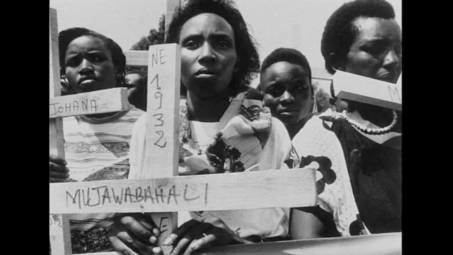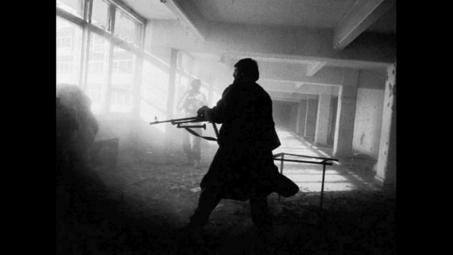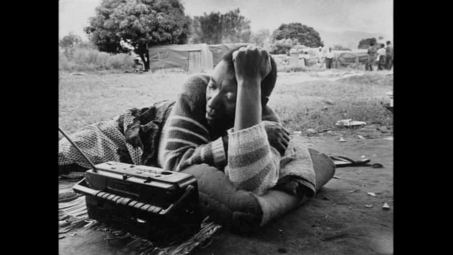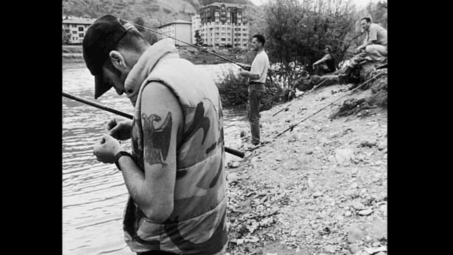Image and Sound: An interview with Nicolas Becker
Emmanuel Bacquet: Nicolas Becker, you are an internationally recognised sound creator, contributing to the scores of many feature films, from La Haine to Brotherhood of the Wolf, including Harry Potter, Gravity, Thomas Vinterberg's Kursk and very recently Sound of Metal, whether as foley artist or, more broadly, supervising sound designer.
The series of shorts Populations in Danger was produced from rostrum camera footage of Alexis Cordesse's photographs. Do you approach the sound differently when you're dealing with a succession of stills?
Nicolas Becker: Working with a rostrum camera is much more interesting! For example I'm doing a historical documentary on Magellan from rostrum camera illustrations, and what a pleasure it is not to have the constant worry of being in sync! Seventy per cent of the work done on a film is cognitive work so that sound fits picture. The brain has to sign off on this synchronization before we can even start to tell stories with the sound.
Whereas when the picture is abstract... for example I work with a visual artist called Philippe Parreno, who makes lots of strange, abstract images. So the sound I make is more of a "potential" sound, like an off-screen sound or an unknown sound...
When things become freer like that it's more interesting because the brain is in unknown territory...
A benchmark on this subject is, of course, La Jetée, by Chris Marker!
EB: What memory do you have of the Populations in Danger films, with all you've done since?
NB: I remember very well, even though I've lost touch, Alexis Cordesse was someone very close. Eyal Sivan too, in fact I did the sound for his film The Specialist. It was the film made from archive footage of the Eichmann trial (from the viewpoint of Hannah Arendt). It was a really important time for me. That may have been my first film as Sound Designer.
I met Alexis through Eyal Sivan, and Alexis had impressed me immensely, being so young but having been in so many war situations. I think it was also personal, because my grandparents were in the Resistance, so much so that they were very damaged by the war, in particular by torture. They were part of Colonel Rémy's gang, who were a bit crazy. My father was born in a Gestapo prison.
So that side had lots of questions about war: going out there, putting yourself in harm's way. And I vividly remember Alexis' stories about the two or three times he nearly died.
My grandparents were always heroes to me. And suddenly Alexis too was a bit of a hero, a bit crazy: going off to theatres of war and taking so many risks was something I found incredible!
At first he said, "I'd like to do that with sound." I bought him one of the first "zooms", those cheap voice recorders.
"This is what you do," I said. "From time to time, record sounds alongside the photos. It doesn't matter if it's not at the same time. We'll build a story afterwards." So the recordings used are those he made in situ. There were a few sound effects, too. I remember a sequence with the sound of a car that just brought the photos to life.
I once read the remark that "With photography, we show what we cannot see." Photography enables a reading that can't be seen in real time, like a different perception, and working on these photos with sound takes it to another level. It allows us to freeze a moment that shows what we cannot see, and combining it with sound reflects the notion of temporality: without time, there is no sound!
EB: Do you think people have different sensibilities: some being more "visual" while others focus more on sound and writing?
NB: I'm convinced of it. We know that at the cognitive level, the visual is stronger than the rest, but some people are more or less guided by one of their senses... I've always been more sensitive to sound!
What is very astonishing when you work with films crews Is that everyone is very knowledgeable but the costume designers see everything that happens exclusively in terms of costumes, cinematographers see everything according to lighting or focal lengths, and I'm there with my mics thinking, "Well, here I'll be able to do this or that." Everybody's sensitivity is massively developed.
And at the cognitive level, everyone on set has really strange sensibilities, it's a kind of collection of freaks who, all together, have a common purpose – the film – and each one, through practice and passion, has kind of developed superpowers.
EB: Would you say that in both photography and sound there's a common element to creating sensitive worlds that transcend words?
Yes. For me, sound is not "story-telling". There's the voice, of course, which is a particular sound... But I'm one of those people who, as a child or a teenager, loved the songs of the Beatles so much that as I grew up, even though I had the ability to translate them, I carried on wanting to receive them as "height, colour and timbre"... and not meaning.
And besides, whatever "empathy" or "charm" makes us recognize someone doesn't lie in the meaning of the words but in the prosody, the musicality of the voice...
It's a distortion, to be sure; what I like is something that is more confusing than language... I like to make sound because I like the opacity of it (to use Glissant's term). Because you can get lost in it; it's a personal world where not everything is clear, not everything is explained... that's what I like about sound: the mysterious side of sounds, sounds of life...
EB: You have projects related to contemporary art; have you had other projects with photographers?
NB: I seem to remember working on still images with Raymond Depardon on an exhibition at the Musée d’Art Moderne, a work on the desert and I had researched the theme with him... That's going back quite a way. I also worked on his film Paris.
And then I worked with Salgado, too: actually I mainly worked with his son, Juliano Salgado, who was co-director. That was a very beautiful world. I'd go a long way for the chance of those kinds of beautiful images...
I had begun working with Marcelline Delbecq, photographer and visual artist, who works a lot on the potentials of images...
It's something I'd like to do more often: that's what Godard said about the film that he made in 3D (Goodbye to Language, Ed.). He was asked why he was making the film in stereoscopy and he replied that because nobody was making 3D films any more, there were no codes and we were free. I really feel like I'm in a situation where what I want to do is go to those place, to get the feeling of working in virgin territory, where you're completely free.
Even when I'm working with artists, art history is such a minefield, you can't step out of line. The slightest colour, the slightest gesture is a reference...
EB: Any other upcoming projects?
NB: Philippe Parreno and I are trying to do something for Arles with the LUMA Foundation, which looks very promising. It'll be shown from June onwards and during the photography festival.
Though one shouldn't count one's chickens, I think it's going to be very special and very interesting.
And there's an opera on the cards, from the idea of having an orchestra (the Ensemble Intercontemporain) interact with (US science-fiction writer) Ted Chiang as librettist and David Peterson, who creates languages for science-fiction films, but also with Brian Eno, and Marko Nikodijevic who is a great Serbian composer...
I've just finished three days' recording with violinist Warren Ellis, who works with Nick Cave, and who does fantastic film scores, in particular The Assassination of Jesse James by the Coward Robert Ford.
And soon I'm doing a concert with the Radio France Orchestra; I'll be playing lots of weird instruments and creating sounds... It's Robert Louis Stevenson's Treasure Island...
Oh yes: I'll probably be off to Mexico to work with Alejandro González Iñárritu, but nothing's signed yet...
EB: You're a workaholic. You never stop!
NB: That's kind of my problem. It becomes addictive. I love what I do... I do get tired, sure, I even picked up a chronic illness from overwork. But doing these kinds of projects was my childhood dream so now that I've got it... I won't let go.
EB: You've been nominated for an OSCAR for Darius Marder's film Sound of Metal, and you already won the BAFTA for best sound.
NB: Yes, it's a fascinating film about a musician who goes deaf, and it was really interesting to work with the head cameraman to find a common language on "points of view" both visual and sound. We worked very, very closely with the director of photography, and we managed to create organic feelings pretty close to reality so that when viewers are locked into the movie, they're caught off guard.
A little like in Cassavetes films when there's so much energy that you feel there's more life in his films than in real life!
I think this film creates that kind of moment of turmoil. The director is a total eccentric who grew up in a Gurdjieff community. It's the first American movie I've supervised, then there's the Oscars and the Bafta stuff that falls on me... But with covid, it's not "face-to-face", so it's all a bit weird. In fact the film covers this too – isolation – and that's why it's appreciated right now, because it talks about resilience.
But it's a bit like it's not really happening to me. I'm not going to Los Angeles. I get tweets congratulating me but there's no party. One week before anyone wins, I record a thank-you message with my son... It's really weird and not very festive.
EB: We promise we'll raise a glass to celebrate your Oscar!
NB: Thank you! This interview was a lot of fun. Have a nice evening!
Interview conducted in Paris on April, 13th 2021
Translated from French by Mark Goodwin
Photo credit : Emmanuel Bacquet





